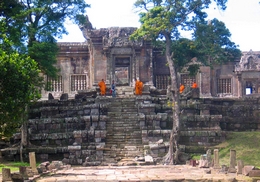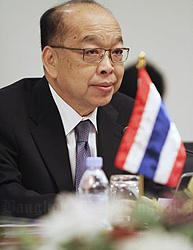- Published: 4/01/2013
- Bangkok Post
Thailand has a larger stake to consider if it
opts to defy a ruling by the International Court of Justice (ICJ) on the
Preah Vihear Temple, the Foreign Ministry said on Friday.

Despite the tensions in the surrounding border area, Preah Vihear temple in the first nine months of last year attracted 13,140 foreigners, up 77% from a year earlier. (EPA Photo)
Amid mounting calls by nationalist groups for the country to defy the
ICJ ruling, the Foreign Ministry has cautioned the public that Thailand
needs to comply with whatever decision is issued from The Hague in
October.
Thailand and Cambodia are preparing their final arguments after
Cambodia requested an interpretation of the original ICJ judgement of
June 15, 1962 which awarded it the Preah Vihear Temple. In the 1962
ruling, the court left alone the surrounding area of 4.6 square
kilometres which are claimed by both countries.
Cambodia is scheduled to present oral arguments to the ICJ judges on
April 15 and 18 and Thailand on April 17 and 19. The final ruling on
the interpretation is expected in October.
Foreign Minister Surapong Tovichakchaikul rebutted certain media
claims that he had vested interests with Cambodia and therefore was not
suited for pursuing Thailand's case.
"My government and I want to see peace and stability and we never let
down our guard," he said. "If the people would like to fight, we will
certainly do so. But bear in mind that the two neighbours are situated
side by side and can't be scissored apart."
Mr Surapong said previously that the ruling in October could result
in a loss or a draw for Thailand, drawing criticism from nationalist
groups including the yellow-shirted People's Alliance for Democracy.
The PAD on Tuesday will submit a petition to the government asking it not to accept the jurisdiction of the ICJ.
The minister said the ICJ would decide only on the temple, not the
territory. Therefore if the ruling turned out to be status quo, it would
be even for Thailand.
"But if the decision touched on the border line, we would lose," he
said after chairing a meeting of a committee that is overseeing
Thailand's strategy in the case. Its members include the defence
minister, the army chief, attorney-general, Royal Thai Survey Department
and the Council of State, among others.
"We have been arguing all along that the ICJ should not tamper with
old rulings," said Mr Surapong. "But from now on, we are preparing [to
promote] public understanding whichever way the ruling will be."
The minister said the public needed to understand all options and
consequences if Thailand chose not to comply with the ICJ, particularly
the trade and economic impact.
 Surapong: "We will never let down our guard." (Reuters photo)
Surapong: "We will never let down our guard." (Reuters photo)
"But I will not announce that we will not lose since it is impossible
to do so, but as I've been informed by foreign lawyers I still feel
confident."
What worried him, he said, was that anti-government forces were exploiting and politicising the ICJ issue.
Virachai Palasai, the Thai ambassador to the Netherlands, said the
oral arguments to be made in The Hague were complementary to the written
statements that both disputing countries have already presented. The
aim of the oral presentations is to highlight some key points to the
judges while the written statements are more detailed and comprehensive.
The body of the Hindu temple, not the surrounding territory, was the
subject of the ruling since it was about the interpretation about older
judgements.
"We should not take it as losing or winning," said Mr Virachai, who
reaffirmed that his legal team, comprising himself, the head of the
Treaties and Legal Affairs Department, three foreign lawyers and two
foreign assistants, had received full support from the Yingluck
Shinawatra government.
"We have been working with technical and legal forces and there has
been no intervention in our work," said the diplomat who was appointed
by the previous government.
Mr Virachai noted that there were four scenarios for the October
ruling. The court might say it has no jurisdiction, it might decide in
favour of Thailand or Cambodia, or in favour of both sides, he said.
"As members of the United Nations, both countries have to comply with whatever decision will be made," said the diplomat.
UN Article 94 has a clause concerning compliance with ICJ rulings.
If one side believes the other is not complying, he said, it could
report or make a request to the UN Security Council to make the party
abide by the ruling.
Mr Virachai noted that Thailand was also campaigning for a seat on
the Security Council. There was no precedent for any disputing party
defying an ICJ order, he added.
Sihasak Phuangketkeo, permanent secretary for foreign affairs, said
Thailand should not prejudge the outcome but people should understand
the defence the country has been preparing.
"We are confident and adhering strictly to this defence approach.
Next month, the committee representing Thailand in the case will also
meet the foreign legal consultants in Europe," he said.
Mr Sihasak noted that as long as Thailand was part of the
international community, "we should respect the norms, as long as we
still need foreign investment and international trade relations".
The permanent secretary concluded that the ICJ ruling was an issue
concerning all Thai people, therefore compliance or non-compliance was a
decision that could only be made by parties receiving public consent.

No comments:
Post a Comment